Scott Molina, The Terminator
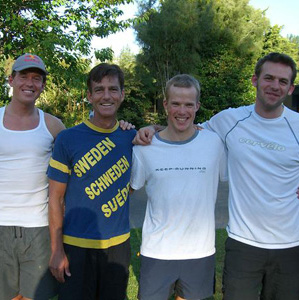
Scott Molina won the Ironman World Championships in Hawaii in 1988 and earned over 100 professional victories around the world. He is also called “The Terminator” and “Skid” and he now resides in Christchurch, NZ with his family. We were able to pin him down for an interview.
ST: Scott, you did not start in Kona in 2006 and 2007. Will we see you racing in Hawaii again?
Scott: I hope so. I’ve had a myriad of physical problems the last few years and have just come off a small knee operation and that knee is still buggin’ the hell out of me. So I try not to make any concrete plans. During my downtime, I even explored a nouveau casino en ligne Canada to keep my mind off the lingering knee pain. If I’m healthy then I’m gonna crank out some races! I do quite a lot of bike racing when my running is a struggle, and hop into quite a lot of running races here in Christchurch when my running is going OK. I am trying to pace myself to a degree so I can get to age 50 in reasonable shape again as I’ve always had some very ambitious goals for 50+.
ST: Looking back at when you were racing as a professional, do you think triathlon has changed quite a bit?
Scott: Certainly at the highest level there is a distinct separation now between IM athletes and ITU athletes. In the 80’s and early 90’s everyone did all distances including duathlons and we raced a lot. I raced approx 265 pro races in 13 years. The other main differences that I notice most are that many more countries are represented at the highest level and there are a lot more IM races.
ST: Are the fields much tougher now as they were then? (Pro and AG)
Scott: The depth has improved at all distances, but much more so in the age group ranks. The caliber and depth of the 50+ age group is astounding compared to what it was 20 years ago. At the pro level the standard was always very high in the top 5 at major events – similar to what it is today.
ST: What do you think about all this technology that is now available?
Scott: Its fun, but its also quite a nuisance trying to keep up with it. I’m very nostalgic so a lot of the new stuff doesn’t do much for me. I mostly ride my blue steel bike made for me in ’83 by a guy named Rob Roberson who built bikes in San Diego. The other thing that amazes me is the number of people who seem to find a need to be preoccupied with quantifying, categorizing and verbalizing all aspects of the sport. Simplicity seems to be a rare and out-dated notion these days that many people aren’t too fond of holding in high regard. I just don’t get it! But then perhaps that’s because I’m a bit of a dinosaur.
ST: How different is prize money these days compared to when you raced professionally?
Scott: In general the total amount of prize money available has grown a lot but so has the total number of people trying to win some of it. The only area of prize money that hasn’t grown is the amount offered in most IM races. Most have had a $50,000 total prize purse for the last 20 years. IM NZ is a good example. If you factor in inflation then its clearly has actually gone backwards a tremendous amount. That’s a measly sum when divided among 10 pros, and a very sad state of affairs that is an embarrassment to our sport and really needs to be addressed immediately to give our sport credibility to a wider audience.
Cash sponsorships and endorsements seem to be proportionately the same as we had in the 80’s and 90’s. They’re still very top heavy like most sports. There hasn’t been an effective athletes lobby group or association in our sport and until that happens I suspect that event owners will continue to cream it while the athletes scramble for free bread slices at the local bakery. (Thank God for the Great Harvest bakery eh!)
ST: Your Slowtwitch screen name is Skid; can you explain to our readers how you got that name?
Skid: My friend, former pro and former agent Charlie Graves gave me that nickname when I seemed to be skidding along the pavement quite a lot in ’84 (I think). I’ve only had one skid since ’87 though! (knocks on wood…) and that was on some gravel on a curve where I just didn’t see it even though I ride with quite a lot of common sense now. I forgot how much it hurts!
ST: Do you think your coaching philosophy has changed over the years?
Scott: Yes, it has changed some, especially with regards to run volume the number of long runs for older athletes. I realize now that things can and do wear out and we’ve got to have more respect for our bodies if we want them to keep going for many years. I’ve also learned preventative maintenance needs higher priority in older athletes.
I’ve always trained with a lot of different athletes from all over the world and always have been a student of endurance sport so I’ve always realized that there are many ways to approach training, yet arrive at the finish line at the same time. I suppose the main difference is I tend to emphasize the enjoyment factor more than I did in my earliest years of coaching. What became more evident to me the longer I coached was that if people were having a hell of a good time training then they would hang around long enough to get good.
ST: Tell us what your typical workout week looks like.
Scott: I generally workout approx 20 hours/week year round. I may do a little less if life conspires against me, but I work very hard at preventing that. I like to do 2-3 sessions day. If life is going as I want it to and it generally does, that’s what I do. I’ve been unable to run many weeks each year for the last 3 years so have tended to ride and swim more. When I’m running some, but not specifically training for an IM a normal week looks like this: 3-4 gym sessions, 4-5 swims, 3-4 runs, 3-7 rides.
Monday – 50 minutes gym (mostly upper body) then straight into the pool for 50-80 minutes swim. Perhaps a ride of 90 minutes – 3 hours in hills if weather is decent.
Tue – ride 90-120 minutes, run 60 minutes, lower body gym.
Wed – swim 60 minutes, run or ride – could be anything!
Thu – like Monday
Fri – swim an hour – might even do something fast, easy run
Sat – long group ride or bike race
Sun – optional day but I always do something.
I paddle my kayak a fair amount too when I’ve got a running injury or I’ve got a Multisport event coming up. I love working out. That’s the bottom line for me.
ST: Would you actually like to see a different venue for the Ironman World Championships, or is Kona the place for it?
Scott: I love the history and the challenge of Kona but I’d like to see WTC move the World Champs around to include some cooler races and some hilly/mountainous races.
ST: What about Ironman races in general. Are there too many of them? Or would you have a place in mind where another one should be?
Scott: The fact that they almost all sell out immediately tells me there’s a good demand for them. I would like to see some cooler and/or mountainous races like I mentioned before. There used to be a couple of great ones – one in Tahoe and one in Colorado. I loved the challenge of EmbrunMan also. Those types of races really minimize the effect of drafting so are a much fairer test. You really don’t even need drafting marshals at those types of races.
ST: Drug use is a fairly hot topic in professional sports; do you think it was as much of an issue then?
Scott: Not nearly as much as the good drugs weren’t invented then! Blood doping certainly didn’t seem to be evident and the only drugs common in other sports like steroids weren’t attractive due to the associated weight gain. There also just wasn’t the general knowledge of how to use them properly as that knowledge came later through the medical support in cycling mostly. Testing became common in the late 80’s but it was always a shambles. Not much has changed in 20+ years in that regard. It is still a joke. The whole idea of testing is still really only a PR exercise for the businesses that make money from the idea that the athletes are clean.
ST: Can you tell us which foods you like and dislike?
Scott: I’m not picky. The only things I avoid are butter, cheese, pastry, deep fried foods and bread. I eat a ton of non-fat dairy products and all high-protein foods. I drink way too much! I think I’m classified as an alcoholic according to the drinks/week chart.
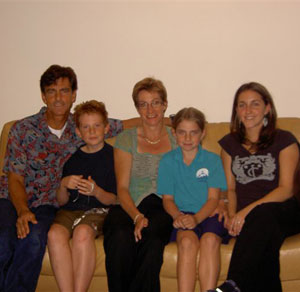
ST: How is the family doing?
Scott: Good! My older daughter Jenny (age 26) is really enjoying the big city life living in London. Miguel (14 years old) is in his first season of rowing and really loving that which is a big surprise as he loves laying around doing nothing or playing video games most of all. Tandia (age 11) does everything so she keeps me busy. I’m like her damn personal assistant / chauffeur / maid / cook / etc. I guess that’s parenting. Erin is still trying to figure out how to not be a workaholic. She still manages to work out quite a bit and still moves along at a pretty good clip when she wants to. She needs to keep busy. She’s out sanding the veranda with a huge belt sander as I type this! HA! ☺
Life here in Christchurch has always been just as I want it, except for being just a little too cold at times.
ST: Would you and/or Erin recommend or dissuade any of your kids to get involved in triathlon at the professional level?
Scott: We’ve decided we will leave it up to them to decide what sports or other areas of interest they choose to pursue, but from day 1 we’ve always encouraged them to aspire to greatness in at least one aspect of their life. I have made them do some swim and run training since they were about 6 so they’re decent at both already. I wanted to make sure that they got a good start on developing their cardiovascular system and so far they are way ahead of most kids their age. Tandia in particular is an outstanding x-c runner. So if they choose to do triathlons at some point later on I know they will have the basic tools to do well.
ST: Is there anything else we should now about you?
Scott: One thing that’s never mentioned about me when discussing my pro career is the fact that other than Kona I never raced any triathlons that didn’t offer prize money. None. I did that because the only way to build the sport at the pro level was to force the race directors to offer prize money if they wanted the best people to show up. That’s not to say I didn’t also receive appearance money, but the races had to have prize money. That’s one aspect of my career I’m most proud of.
Other stuff? I did a hell of a lot of interviews. This one here is one of the easier ones! I was interested to hear Greg Bennett recently talking about doing the media rounds to promote the concept of big money, short course racing in the USA since he’s done so well off of it. Of the 50 USTS series races I won I did an average of 4 interviews per race. That’s a part of being a pro that a lot of pros have no part of or responsibility for. The top people may earn most of the money, but they also promote the sport to a degree that it can support a lot of other pros. I’d much rather be out there doing it than talking about it any day!
ST: How about a closing thought?
Scott: One last thing – I had to race Dave, Mark, ST, (and later Mike Pigg) for a living for my entire career, which lasted 13 years. Winning a hundred pro races in that company was damn hard work and I’m still kinda pooped!



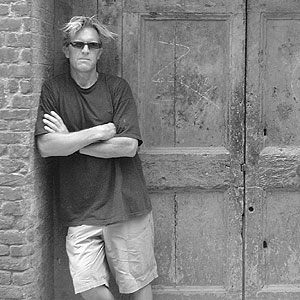
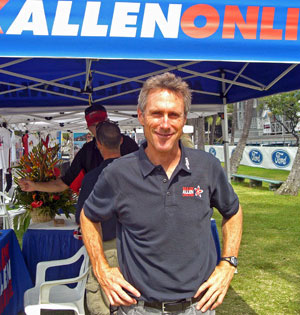
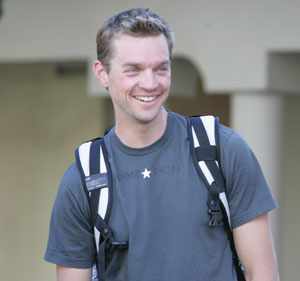
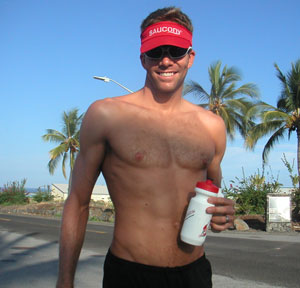

Start the discussion at forum.slowtwitch.com